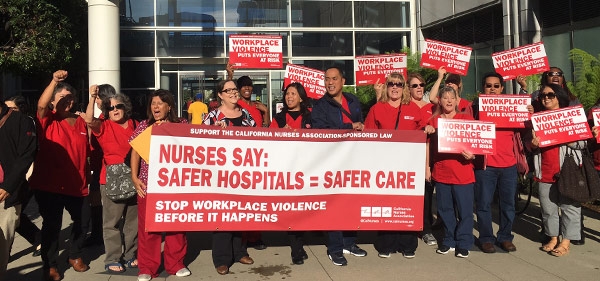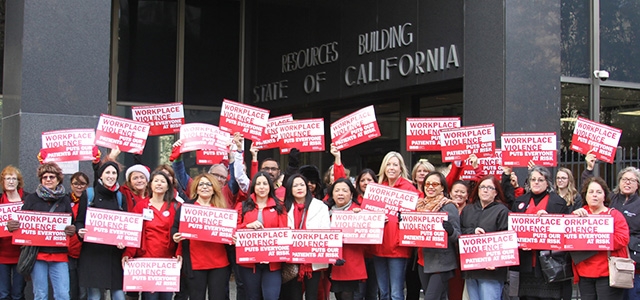Violence in Nursing
When Ashley became a nurse, she dreamed about helping patients and relieving suffering. She never thought she'd be hurt, much less attacked. Her second day on the job, a patient threw a heavy tray across the room, splashing her with orange juice and bits of scrambled eggs. The tray hit a nearby wall, narrowly missing her ankles.
The reason? "I told you I don't like scrambled eggs!!"
She froze, stunned and speechless. Nothing in her upbringing or training had prepared her for this. She could not understand why a patient who was receiving care (in this case, free care) would be abusive and not appreciative.
The news has reported several horrific incidents of late. Recently a nurse at Delnor Hospital/Northwestern in Geneva IL was taken hostage in her own hospital on May 13, 2017.
In another incident, also in Illinois, on June 6th at St. Joseph's in Joliet, an inmate used a makeshift weapon to take a nurse assistant and a guard hostage.
On June 4th at Amita Medical in Bolingbrook, a nurse in the ED was punched in the face by a patient.
We all heard of the incident that occurred in a New York hospital June 24th, where the perpetrator was a disgruntled fired physician (resigned due to alleged sexual assault against colleagues) who brought in an assault rifle, killing one physician and wounding 6 others.
Type II Violence
Abuse can include yelling, cursing, scratching, spitting, hitting, kicking, and verbal threats. Patients with behavioral health problems, alcohol intoxication, substance abuse, prolonged waiting times in the ED- all can contribute to violent behavior.
Called type II violence, there is an epidemic of patient/visitor perpetrated violence towards nurses. Nurses (and nursing assistants in particular) are at highest risk for being injured through workplace violence.
Hospitals have become hazardous workplaces. The ED setting, in particular, is prone to violence. Cognitive impairment and demanding to leave are documented causes as are situational catalysts such as the use of restraints. There's extremely high stress, a dynamic workplace, and the violence can come from family members, or patients desperately seeking drugs.
Increased Incidence
"B****!" Where's my pain medication?!!" The vast majority of nurses have been subjected to verbal abuse.
In 2015, OSHA reported patient handling and workplace violence injury rates were highest in inpatient adult wards; these rates were also elevated in outpatient emergency departments, urgent care, and acute care centers and adult critical care departments.
Culture of Acceptance
There's a culture of dismissing and minimizing violence towards nurses. Nurses believe in "doing no harm" and will put patient safety before their own.
Teachers are not expected to tolerate violence. If the same patient who yells and hits a nurse acted out similarly in the DMV, in court, or even at a fast-food restaurant, they'd most likely be arrested.
Culture of Non-Reporting
There are barriers and attitudes toward reporting. Nurses themselves under-report violence. Nurses fail to report, believing it is just part of the job, and that managers may be non-responsive.
Staff is not clear on what to report, or how to report it.
For all these reasons, often traditional industrial injury reporting is bypassed in patient/visitor to worker violence. Organizations do not encourage reporting; they encourage a lack of reporting.
Support and Safety
What support is there for a nurse with an abusive patient? Not much. She can wait until the violence has escalated and call security. Security is often not well trained and I've seen them at a loss; well-meaning, but at a loss.
In Ashley's case, she called security, who responded and alternately tried to pacify the patient (egg and orange juice were still splattered all across the floor) and admonish him. The admonishment was in a "Hey buddy, no more of this naughtiness, OK" in a male-bonding manner.
What's Needed
- More training for staff to recognize impending signs of violence. There are effective methods to mitigate escalating violence but they must be taught. In some states, OSHA requires training for staff working in violence-prone areas such as ED and Labor and Delivery
- Legislation. Thirty-two states have made it a felony to attack nurses. Nurse need protection and support.
- A zero tolerance for violence. Nurses are conditioned to accept violence.
- Workplace violence surveillance to determine where interventions and resources need to be employed. Employers have a duty to provide a safe workplace for staff and patients.
- Increased security.
- Staff support and debriefing after a violent incident.
- Encouragement of reporting. It should be clear that the expectation is to report violence and to clearly define the boundaries of unacceptable behavior.
- *Public education about the proper use of emergency rooms.
I believe employers have a responsibility to provide a safe workplace. Not everything can be prevented, but it seems the signs are clear that violence against nurses is escalating. What do you think will help?
Occupational traumatic injuries among workers in health care facilities-United States, 2012-2014. Health Care, 2012. Retrieved July 24, 2017 Occupational Traumatic Injuries Among Workers in Health Care Facilities - United States, 212-214



JKL33
7,043 Posts
Excellent post in its entirety, though I've only quoted a portion.
Working @ random ED: Patient with weapon (not a gun) and violent/threatening behavior. Staff was in a safe position, I called the police. I hung up the phone and everyone told me I was in BIG TROUBLE because they aren't allowed to call the police to come to this ED. I politely said to the effect 'we'll see about that'. As soon as I encountered the supervisor (later) I told her, "Oh by the way. I had to call the cops earlier for a violent patient waving a weapon around. These guys have told me I'm going to be in trouble because they aren't allowed to call the police, but I told them they must have misunderstood because that is ridiculous and would be a major legal issue!". She said "Oh....well....good work. I have no ideeeeaaa why they would say THAT??!!"
I was prepared to be as assertive as necessary over this issue but as it turns out I never heard another word about it. And that, right there, was the end of them being "not allowed to call the police."
We all have to put our foot (feet) down. For the best results, I suggest making no apologies and leave no room for being bullied about it.